Text
#TechnologyCommons is there a future?
➛ Blogging about the technology commons has been great! I think that this course has created both assignments with structure and assignments with less formal structure that personally worked for me :) I chose this group of commons among the others because I had something to say and contribute.
➛ Technology will not always be free and more importantly it will not always be held in common with all regular consumers. And with big corporations as Sukhpal mentioned taking over different channels and avenues of technology to monitor and to become more financially stable from - I think that the commoning of technology is headed in a interesting path to say the least.
➛ This blog has kept me aware of issues regarding copyright, sharing versus private usage and very importantly - the social impact that technology has on commoning and vice versa! It is up to users and those who are in a position of power to create positive and health outcomes {ultimately atleast} to help better where the #TechnologyCommons are headed!
➛ As I sign off I would like to give kudos to the rest of our blog's contributors! It was definitely fascinating to read everyone's contributions and gain some insight. An honorable set of mentions go out to our T.A & to Professor Andrea M. for being great mentors, teachers and a wealth of information to the class and to me! It's my last few days at UTM and this class certainly taught me plenty! Good luck to the rest of me peers!
~ Joseph A. Fernando
1 note
·
View note
Text
Isohunt: Resurrected
Isohunt Ressurected
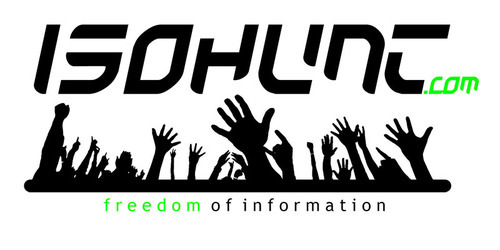
Those familiar with torrenting may recognize the bit-torrent hosting site Isohunt, which lost a massive legal battle started by the Motion Picture Association of America (MPAA) due to the downloading of thousands of films via torrent files. While the world of torrenting remains constantly at odds with the world of copyright infringement, i just wanted to post this concerning the matter of free software and free-information mainly because the closure of the Isohunt main website led to a clone being created, in which many of the files had been transferred and moved over into the new site. No longer being called www,isohunt.com, the new URL of www.isohunt.to is seeing a prosperous return as a free-information client for all with an internet connection to enjoy.
To view the old webpage, with its shameful yet entirely corporation-pushed message, here is the URL
http://www.isohunt.com/
-Zachariah
0 notes
Text
Free Mobile Phone Charging Stations: Modern Commons or Gateway for Corporate Interests?

This article describes the small canadian father-daughter business DanTeb, who have provided a service that allows passers-by to charge their phone on-the-go. This service, which is absolutely free, provides plugs for iPhones, Blackberries, Androids and tablets. This might seem like the perfect beginning to a new technological commons within our modern world, where the service provided is open for all around to benefit from. However, DanTeb has struck deals with big name companies like Rogers and Telus, and each station spews out advertisements for other corporate giants.
Where there's people, there's business.
This is almost an example of a tragedy of the commons, plucked from it's infancy as a beneficial concept for the community, but destined for a life run by a corporation.
-Zachariah
0 notes
Text
My Conclusions on Blogging about Technology Commons

I wanted to conclude this blogging experience with my thoughts on the future of technology commons.
Looking at all of my blog posts, I started off looking at legal battles that were happening in court with large corporations like Microsoft. I then went into what people were doing to fight against these enclosure movements that were sometimes being sanctioned by courts.
I discovered campaigns, conferences and also looked at who these people are exactly, who have the courage to go against this "second enclosure" movement (in another blog). I then continued on and divulged slightly into hackers. I finished off with some examples of corporations going against each other in this battle.
Overall, we see that the battle is ongoing and it is continuously happening as I post this.
It is a struggle. We now slowly see corporations, as discussed in another blog, taking over the channels we use to have discussion around not only about the technology commons but others. These companies are taking over these venues and monitoring what we post and blocking what they do not see value in maximizing THEIR profits. I believe we should also take into consideration how the framing of these struggles are often portrayed by the media when we look at the future of the commons movement (since media is being slowly taken over by large corporations). When we read about these movements such as Occupy movements or a protest in general, we tend to see the framing of these stories become negative. For example, the strike by Canada Post workers a few years ago. The media tended to frame it as an INCONVIENCE to the broader public, by not being able to receive their mail for example, and so on and the praising of things like the Back to Work Legislation. This Legislation forced the strike to be over. But we see a difference when media covers stories involving companies. For example, when companies shut down a factory and it devastates a whole community of people, media tends to frame it as it just being a once in a lifetime case and that it is just part of the capitalist system.
With this in mind, going forward, I believe we should be aware of the taking over of these outlets that people use to become aware of these issues. As well as the framing of the issues of the commons in these outlets. Regardless of whether it is technology, culture, money commons and so on, we should self-consciously try to look past the framing and really see the struggles for what it really is and try to find out what exactly is happening and then try to do something about it, if we can.
With that, thank you for reading all my blogs.
-Sukhpal
0 notes
Link
This article by Amy Vernon discusses the advantages of offering open source softwares, especially to areas where technology is difficult to afford. FOSSFA (Free Software and Open Source Foundation for Africa) has helped countries in Africa to map reports of violence in Kenya, map areas where there is a desperate need of assistance after earthquakes, and also demonstrates the power of the community to find solutions to problems using the technology that's available to them.
Jessica Ayoubi
0 notes
Link
This link I posted shows some Pros and Cons of Open Source Technology. It is important to recognize that while an open source sounds glamorous to users, it isn't entirely perfect. Like the old saying goes, nothing good comes free, and there's always going to be a cost.
PROS:
few licensing fees - there may or may not be licensing fees, but there will probably be maintenance fees
easy to manage - there is no restriction as to how many times you can install the programs
continuous improvement - because it's an open source, anyone can fix the software's issues at any time (no need to wait for the next release)
company independence - if the software's company fails, the source code can still be used and carried on
hands-on exploration - the source code can be explored to further better the software
CONS:
not entirely free - sometimes the software involves administration and support costs
there's a learning curve - you must always be up to speed on the latest technologies
confused users - users must be able to know what each software has to offer them
orphan software - original programmers might quit, and move on to a new project
You're on your own - no one from the software company is there to help you if you encounter any issues
Jessica Ayoubi
0 notes
Link
Wikipedia
Wikipedia is an excellent example of open source technology. This website offers a vast amount of information on a variety of topics. Most importantly, it is a collaboration of information supplied by volunteers globally. This website is like an encylopedia, offered free of charge to the public. When volunteers were asked why they spend their time offering this site information free of charge, their answer is, "Because I love to teach!" However, a big issue relating to this website is the reliability and accuracy of information. If almost anyone can post on this site, how sure are we that this information will be true? For this reason, many teachers and professors do not allow research from Wikipedia.
This article by Dana Blankenhorn explains the importance of Wikipedia…take a look! Here's part of it below...
Mirror mirror on the wall, what's the most important open source project of them all?
· Are you asking about economic impact? Then it's probably Linux, or maybe the Apache Web server.
· Are you asking about user base? In that case I'm thinking Google's Android, or Mozilla.
· But if you're talking about active participation, getting people's hands on the guts of the thing, having them donate that back to the commons, and fulfilling the idea behind open source, there can be only one answer. Wikipedia.
-Blankenhorn
Jessica Ayoubi
0 notes
Link
The Simpson's episode Movies for the People (in a previous post) reminded me of the Movies Under the Stars screenings that occur in Mississauga and Oakvile.
It made me think of the Razsa reading - and using the public/common space to engage in free collective activity.
The Movies Under the Stars is in no way "radical activism" but it offers people a means and place to collectively enjoy an artistic medium.
Movies Under the Stars uses social media space to encourage people to come out and watch films.
https://www.facebook.com/RotaryMovieNights
Isn't this a nice idea? Using a park to bring people together to enjoy a free night at the movies!
SHARE!
- Gabrielle
0 notes
Text
Steam Workshop: Modder's Common Paradise
The PC Gaming client/host Steam has for years allowed gamers to purchase and play video games on their computers for competitive prices compared to market value. As a host, Steam allows users to maintain their video game library in a ‘cloud’ memory, so that they might download the game files onto any computer through their username and thus play whatever game they have purchased. Belonging to the Valve Works company, many games have originated on steam and are thus only available through the client, however other developers and artists are welcome to place their games up for sale on steam; for example, games such as Elder Scrolls: Skyrim and many from the Call of Duty Franchise, which simultaneously make an appearance on more popular gaming consoles such as Microsoft’s Xbox 360 and Sony’s Playstation 3 are also available for purchase on Steam, typically for a much more competitive price.
One of the magnificent things about Steam is it’s loyalty and support for online modding and developing communities. Within Steam, the purchase of a game also allows access to what is known as the Steam Workshop: a conglomerate of free and downloadable mods for your games, which also allows you to post your own creations for everyone else to enjoy. The video-game modding community takes largely from this Workshop, where a free and open source for game modding is available to all those who sign up for Steam (which is entirely free to join) and who purchase games through the system. The games available to purchase from steam are again typically much cheaper than anywhere you would buy them in a local store, and with weekly specials and two major annual sales (one presiding over the course of a summer month, and the other during the Christmas season) access to this community is quite easy and fruitful. Free-to-play games often make an appearance as well, thus further pushing the envelope for the gaming community to take part in this shared commons of ideas and mods. Some games with a large and expansive mod-support base have become immensely popular, and can even change the way people play video games entirely.
-Zachariah
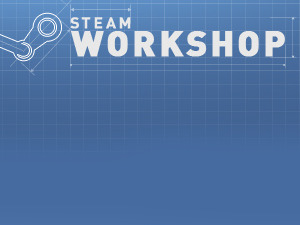
1 note
·
View note
Text
I ♥ Open Source

I would just like to add my (quick) personal opinion about open source technologies. They have a lot to offer, especially in terms of educating others! For one thing, I saved a lot of money on textbook in this anthropology course through the creative commons, and for this, I am greatly appreciative. Additionally, anyone around the world that can access the Internet can also access a vast amount of information. This allows people that cannot afford to have an education the opportunities to learn for free. This is why I am a proud supporter of free, open-source technology.
(And yes, I am a Simpson's fan!)
Jessica Ayoubi
0 notes
Link
SOPA
I know many of you have heard of SOPA, but take a look at this article by Luke Johnson from the Huffington Post. For those of you that do not know, SOPA is the Stop Online Piracy Act, a bill that tries to stop online piracy and copyright infringements. It provides more details on how this bill works, and whom this can affect. Most of what I read was very shocking. Luckily, this bill is not official yet since so many protested against it. For now, plans to pass this bill have been postponed.
Take a look at some of things a corporation would be allowed to do according to the SOPA bill:
· “If that court order is granted, the entire website would be taken down. Internet users who typed in the site's URL address would receive an error message, and for all appearances, the site would never have existed. Importantly, the court does not need to hear a defense from the actual website before issuing its ruling. The entire website can be condemned without a trial or even a traditional court hearing.”
· “Copyright holders can demand that payment processors to cutoff the flow of money to a website or that search engines eliminate links to it -- without ever entering a courtroom.”
· “Movie studios and record labels can also require online advertising networks on the website and Internet service providers from hosting the site.”
· “Internet service providers and payment processors could not be sued for taking action against sites that were not, in fact, doing anything improper.”
It is evidentthat SOPA gives an enormous amount of power to large, multi-million dollar companies for the slightest copyright infringements. If a young person wanted to post a link to watch a free movie on Facebook, this bill could allow the shutdown of the whole site! If the online community did not fight this bill the way they did, a majority of websites would have shut down and the Internet would not be the same anymore.
Jessica Ayoubi
0 notes
Link
The Cost of a Free Internet
Check out this YouTube video of Edward Snowden speaking at TED2014 about surveillance and Internet freedom. In this TED talk, Edward Snowden explains how the government forces corporate America to do their dirty work for the NSA by making private information such as phone records, travel information, and browsing history available to the NSA to (apparently) “prevent acts of terrorism” (I still see terrorism happening…just saying). They do this through Prism – a surveillance program launched by the NSA – where large corporations take private information from their users and gives it to the NSA. Companies that allegedly joined Prism include Microsoft, Yahoo, Google, Facebook, PalTalk, YouTube, Skype, AOL and Apple, although they deny their participation. (BTW, have you ever noticed that something you searched for in Google appears in advertisements everywhere else on your browser? Exactly.) When Yahoo challenged Prism in court, they lost because they were never tried by an open court, but by a closed, secret court. Snowden exposed this to the public and caused uproar as the public questioned their privacy.
People were challenged with the question, “If you did nothing wrong, you’ve got nothing to worry about”. However, it is still a matter of privacy. For example, imagine the government placing surveillance cameras all around your house. You probably are not doing anything illegal, but privacy is a right that everyone should have. When we give up our privacy rights, we will no longer be free. Snowden explained that our privacy is part of our cultural identity, and anything we do or say might be misinterpreted by the government trying to figure out our true intentions.
In regards to Snowden leaking NSA files to the public, some people call Snowden’s actions as reckless and dangerous for getting involved with the U.S. intelligence agency, but many people see it as a heroic act of informing the public. Snowden argues that, “We don’t have to give up our privacy to have a good government. By working together, we can have both an open government and private lives”.
Jessica Ayoubi
0 notes
Photo
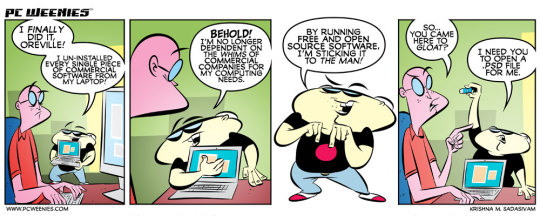
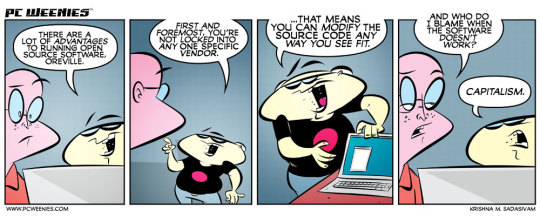
PC WEENIES
Here's two comics illustrating that while open source softwares offer a sense of freedom from commercial companies, many people still rely on them to complete many tasks. In the first comic strip, the guy on the right was so proud to un-install all commercial softwares from his computer, yet he still needed the software to open a PSD file - which requires the use of PhotoShop - one of the commercial softwares that he deleted. In the bottom comic strip, it illustrates that there are so many advantages to open source softwares. A benefit of open source is that anyone can modify the source to better improve it. However, if something goes wrong, who is to blame? With commercial softwares, the company takes full responsibility of the program and fixes anything that does not work. This is one of the major benefits of using a commercial software program.
Jessica Ayoubi
0 notes
Photo

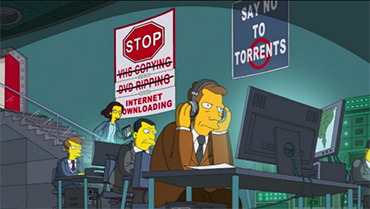
Just for those who need a break from all this reading...check out The Simpson's episode "Steal This Episode"! This episode shows Homer learning that he doesn't have to pay to watch movies anymore - he can illegally watch them for free online. Homer decides to open up a free theatre in his backyard and play movies he downloaded from the Internet and called it “A theatre for the people”. I found this brilliantly relating to our course discussions on the commons and the debate of art and culture being free for everyone to enjoy.
Similar to real life, everyone has their own opinions on whether or not pirating movies is a bad thing. Marge Simpson is one of those people, saying, “When I was watching that pirated movie, I was stealing with my eyes”. Her guilty conscience made her send a check to Hollywood paying for a movie ticket. Little activist Lisa argued that, “It wasn’t like dad was stealing for himself. He created a wonderful experience for the whole town”. This is an example of why people feel so strongly about making technology a commons for all to enjoy.
In the end, Bart asked Lisa, "So, who are the good guys here - the media companies or media freedom guys?" She replied, “Both groups claim their intentions are noble, but in the end of the day, they’re both trying to steal as much money as they can”. From this, it is evident that both sides have great things to offer; yet they also both have selfish agendas. Companies that work to make these films obviously want the money that they earned and movie watchers obviously want to enjoy these productions for free.
Jessica Ayoubi
0 notes
Text
Mozilla Firefox versus Internet Explorer Part 2

I left off in the last blog (Mozilla Firefox versus Internet Explorer) asking if there was any hope for Netscape Corporation and Mozilla Firefox.
The answer is YES!
After Microsoft did what it did to make Netscape Corporation decline, Netscape responded by releasing the source code for the browser in 1998. Furthermore, Netscape Corporation founded a non-profit organization called Mozilla Foundation to look after the development of the browser.
If we look at today, Mozilla Firefox is still popular and is a true example of an open source project that is still thriving in our ever growing proprietary system.
Here is the link to the Mozilla Foundation:
https://www.mozilla.org/en-US/foundation/
Check it out!
-Sukhpal
0 notes
Text
Mozilla Firefox versus Internet Explorer
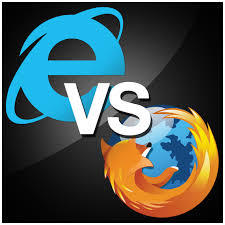
Ever wondered the origins of Mozilla Firefox and its implications?
Mozilla Firefox web browser was released in 1995 by Netscape Corporation. It was based on Mosaic, the first graphical browser for the Internet. What was unique was that Netscape released it for free. Also, at the time, Mozilla Firefox was faster than Microsoft’s Internet Explorer (IE). This also shows that the mentality that “if you buy it, it’s better” is clearly not true. Particularly in this case, because buying IE was not better in terms of quality.
In response, Microsoft began the bundling IE into its new versions of its OS. As mentioned in another blog “US Department of Justice Investigate Microsoft During the Late 1990s,” Microsoft was sued for the bundling of proprietary software because of these actions and others by the US Department of Justice. But despite this, Microsoft was successful at its main goal because Netscape Corporation began to decline in the late 1990s.
Is there hope for Netscape and Mozilla Firefox? Look out for the next blog.
-Sukhpal
0 notes
Link
A move away from textbooks in response to government cost-cutting is increasingly pushing teachers and students in Ontario toward free online materials that may not have been properly vetted for suitability, a report issued Monday concludes.
Interesting news article that mentions the positive and negative consequences of accessing free material online. This article talks about how budget cuts for school materials have forced many teachers to switch to using free, online material in their class. At first glance, this may seem like a good thing, as if good, quality material can be accessed for free online, then why not utilize that material to save costs for the school? Not to mention the use of technology in the classroom has often been found to engage the students more deeply into the work/discussion. However, as the article points out, the teachers are left to make decisions on the material to use, resulting in lower quality materials being used as well as a de-standardization of material being taught across classes. In addition, for schools in districts with families in a lower socioeconomic class, many students may not have access to these online materials.
I think this article is important because it highlights the positives and negatives of using free material found online, and specifically shows how you need to critically evaluate the situation based on a number of situations. Simply being free and online does not make something an automatic answer, nor does it necessarily make solving a problem any easier, as often it may complicate the matter even more. It's easy to decide to shift everything in your own life to free or open source, but on a large scale multiple barriers will present themselves.
Edit: Upon further reflection I thought that this article may also point to the issue of the tragedy of the commons in terms of access to free information on the internet. in this case, the tragedy is not so much that members are not contributing when they take from the commons, but that much of what is contributed is not of useful quality. This is especially an issue in a school setting such as this, as of course we don't want these young children being taught incorrect or inappropriate information. Perhaps this is sort of an updated version of the tragedy of the commons then, as we must become wary of the commons because of this influx of user added content that may not be trustworthy!
-Olivia Christopher
0 notes